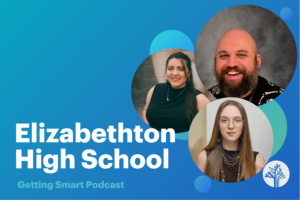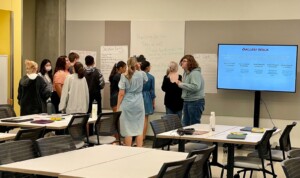3 New Resolutions After 10 Years of Teaching PBL

Crazy as it sounds to me, I started year 20 as an educator last month. In an economy where people bounce careers a dozen times, I stand as an anomaly. For better or worse, I keep coming back.
In addition to being in year 20 of my career as a whole, it is the ten-year anniversary of our wonderful Columbus Signature Academy New Tech High School. That, for me, is the more significant number, because come May I will have spent half of my career implementing Project-Based Learning (PBL).
As far as teaching goes, PBL saved me. I know that if I had not made the switch ten years back, I would have moved on to a “desk job,” or a park ranger gig, or perhaps would have joined a struggling funk band. Who knows—I may still make one of those switches. But for now, I am not ready.
I am not ready because there are so many facets of education that I have not mastered. I figure if I ever do master some of these practices, I probably should do a good ten years of teaching after that point. I owe it to all the kids I shortchanged with bad pedagogy.
So this is going to be a year to re-tool and refine my practices. Here are some of my goals:
1. Finally get smart about grading. My friend and mentor Drew Schrader shared a quote during some summer work that has not left my mind since he quoted it for us. We were talking about assessment practices, and he posed this James Popham quote for us to pontificate upon: “Any assessment that doesn’t lead to an instructional decision is merely a ritual.” Merely a ritual. As in, something we have come to believe is important, even if we are not sure why. A ritual, as in, something we will continue to do, indefinitely, for better or worse.
For four years now, since I was first exposed to Standards-Based Grading, I have inched closer to implementing it on a full-time basis. The idea has real traction now in our building, and we want to continue to improve our practice and plan to do so by conferencing with SBG mentors (like my old friend Michael McDowell, principal and teacher in Marin County, California) and by visiting other New Tech Schools (such as Kent Innovation High in Grand Rapids, Michigan) that have been using SBG for a decade or more.
2. Seek better feedback for myself. It is a standing expectation in our school that every facilitator takes their project idea to an informal and optional meeting held each Monday based on Critical Friends Group. At these meetings, a presenter pitches their project idea in one of a number of ways; most commonly, projects are subjected to a Tuning Protocol (best used for an idea that is well-formed but may want for some feedback on details, logistics, scope of content, etc.) or a Charette Protocol (most appropriate when an idea is there but is a bit formless.)
Personally, I feel like I have drifted away from getting enough feedback on project ideas prior to introducing them to my students. Even projects that are successful and repeatable should be reframed each year to ensure authenticity and continual improvement, and those “tweaks” require feedback from a professional learning network. This year, I am off to a good start with getting ideas in front of a group of trusted and valued peers prior to sharing with my students.
3. Find the next “revolution.” After all, it is our ten-year anniversary. While our school’s vision is to be “A Revolutionary Pathway for Learning,” it goes without saying that revolution is difficult and change is slow (and is a revolution still a revolution 10 years on?). For us, we feel that the next revolution has a little more to do with all of the major facets of who we are: Project Based Learning, a culture of Trust, Respect and Responsibility, and seamless access to technology and information.
The approach that we are taking is one that strives to give students even greater ownership of their own learning, in ways that are age- appropriate. Standards-Based grading is a piece of that bigger picture, in that it gives students clear expectations for what content fluency looks like in various disciplines.
So, too, is a broad swath of voice and choice for students to explore their passions. We have successfully implemented Genius Hour in the last year, and are looking to potentially make it the grade 9 entry point through which students build to an eventual Senior Project. E- Learning, in its current form in our district, is an approach reserved only for extenuating events like a “Snowpocalypse” or other school closure event. But why? As connectivity becomes pervasive, why should we not leverage technology to give students more autonomy, responsibility and freedom?
I feel incredibly fortunate to be a member of a stellar staff full of courageous, envelope-pushing people, ages 14 through 58. Life at school is good, and it is still an exciting place to go each day. And, of course, it’s a challenging job–that is ultimately the reason why I keep coming back! In my acronym-filled educational world, I’m looking forward to a year with lots of PBL, SBG, CFG, and JDI (Just Do It!)
For more, see:
- Smart Review | Is There PBE In Your Water?
- Teaching Students Collaboration Skills Using The Five Dysfunctions of a Team
- 5 Myths of Project-Based Learning Dissected and Debunked
Stay in-the-know with all things EdTech and innovations in learning by signing up to receive the weekly Smart Update.







0 Comments
Leave a Comment
Your email address will not be published. All fields are required.